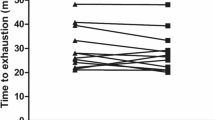Abstract
A hot and humid environment can be detrimental to race performance. Caffeine, on the other hand, has been shown to be an ergogenic aid for improving endurance performance. To examine the influence of caffeine ingestion on race performance during high heat stress, seven endurance trained competitive road racers aged between 23 and 51 years (five men, two women) performed three maximal effort 21-km road races outdoors in hot and humid conditions. The caffeine dose, randomly assigned in a double-blind fashion, consisted of either 0, 5, or 9 mg · kg−1 body mass. During each run, the subjects were allowed to drink waterad libitum at each 5-km point. Blood samples were obtained immediately before and after each run and analysed for changes in concentrations of Na+, K+, glucose, lactate, and hematocrit. Pre and postrun data were also collected for body mass and tympanic membrane temperature. Race times were not significantly different among the races or caffeine doses, with the average times within 1.1% of each other. In addition, none of the other variables measured varied significantly among the races or caffeine doses. In summary, caffeine intake did not affect race performance. Therefore it was concluded from our study that caffeine is not of ergogenic benefit in endurance races during high heat stress.
Similar content being viewed by others
References
American College of Sports Medicine Position Stand (1984) Prevention of thermal injuries during distance running. Phys Sports Med 12:43–51
Armstrong LE, Costill DL, Fink WJ (1985) Influence of diureticinduced dehydration on competitive running performance. Med Sci Sports Exerc 17:456–461
Borg GAV (1982) Psychological bases of physical exertion. Med Sci Sports Exerc 14:377–381
Conlee RK (1987) Muscle glycogen and exercise endurance: a twenty-year perspective. Exerc Sport Sci Rev 15:1–28
Conlee RK (1991) Amphetamine, caffeine, and cocaine. In: Lamb DR, Williams MH (eds) Perspectives in exercise science and sports medicine. vol. 4 Ergogencs-enhancement of performance in exercise and sport. Brown, Indianapolis, Ind., pp 285–330
Coyle EF, Montain SJ (1992) Benefits of fluid replacement with carbohydrate during exercise. Med Sci Sports Exerc 24:S324-S330
Craig FN, Cummings EG (1966) Dehydration and muscular work. J Appl Physiol 21:670–674
Dodd SL, Herb RA, Powers SK (1993) Caffeine and exercise performance: an update. Sports medicine 15:14–23
Essig D, Costill DL, Van Handel PJ (1980) Effects of caffeine injection on utilization of muscle glycogen and lipid during leg ergometer cycling. Int J Sports Med 1:86–90
Falk B, Burstein R, Rosenblum J, Shapiro Y, Zylber-Katz E, Bashan N (1990) Effects of caffeine ingestion on body fluid balance and thermoregulation during exercise. Can J Physiol Pharmacol 68:889–892
Gordon NF, Myburgh JL, Kruger PE, Kempff PG, Cilliers JF, Moolman J, Grobler HO (1982) Effects of caffeine injestion on thermoregulatory and myocardial function during endurance performance. S. Afr Med J 62:644–647
Graham TE, Spreit LL (1991) Performance and metabolic responses to a high caffeine dose during prolonged exercise. J Appl Physiol 71:2292–2298
Jacobson BH, Kulling FA (1989) Health and ergogenic effects of caffeine. Br J Sports Med 23:34–40
Sawka MN, Wenger CB (1988) Physiological responses to acute exercise heat stress. In: Pandolf KB, Sawka MN, Gonzalez RR (eds) Human performance physiology and environmental medicine at terrestrial extremes. Benchmark Press, Indianapolis Ind., pp 97–152
Sawka MN, Pandolf KB (1990) Effects of body water loss on physiological function and exercise performance. In: Gisolfi CV, Lamb DR (eds) Perspectives in exercise science and sports medicine, vol. 3. Fluid homeostasis during exercise. Benchmark Press, Indianapolis, Ind., pp 1–38
Spriet LL, MacLean DA, Dyck DJ, Hultman E, Cederblad G, Graham TE (1992) Caffeine ingestion and muscle metabolism during prolonged exercise in humans. Am J Physiol 262:E891-E898
Van Beaumont W (1972) Evaluation of hemoconcentration from hematocrit measurements. J Appl Physiol 31:712–713
Wyndham KC (1973) The physiology of exercise under heat stress. Ann Rev Physiol 35:193–220
Young AJ (1990) Energy substrate utilization during exercise in extreme environments. Exerc Sport Sci Rev 18:65–117
Author information
Authors and Affiliations
Rights and permissions
About this article
Cite this article
Cohen, B.S., Nelson, A.G., Prevost, M.C. et al. Effects of caffeine ingestion on endurance racing in heat and humidity. Europ. J. Appl. Physiol. 73, 358–363 (1996). https://doi.org/10.1007/BF02425499
Accepted:
Issue Date:
DOI: https://doi.org/10.1007/BF02425499




